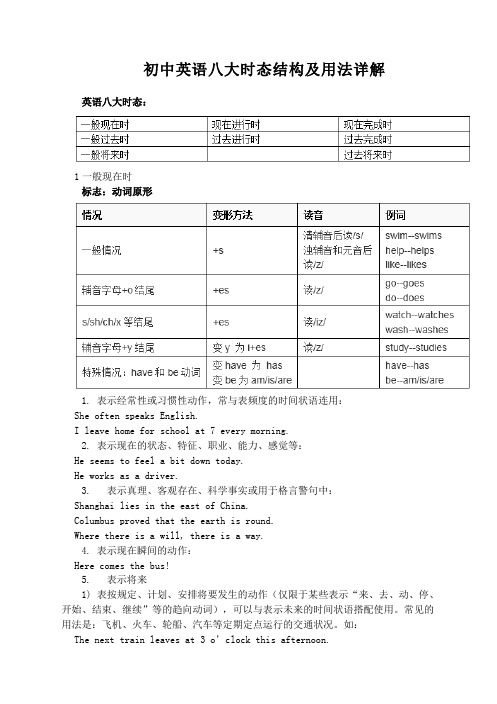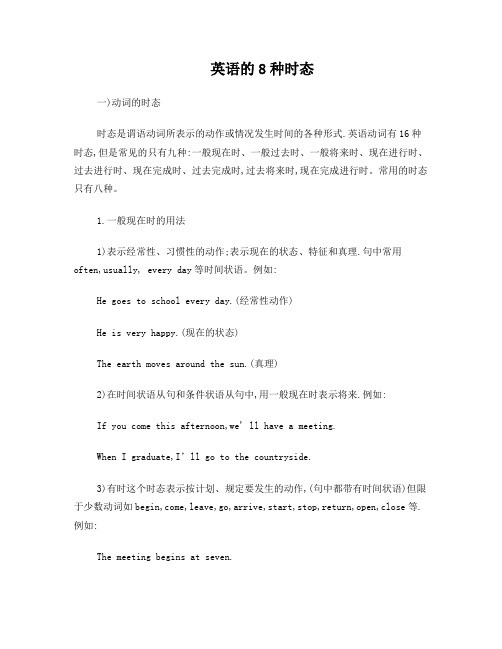8 时态与时间状语 时间状语
(完整版)英语中八种常见时态常用时间状语归纳

英语中八种常见时态常用时间状语归纳一、一般现在时1. 概念:表示现阶段经常发生的动作或现在的某种状况,也表示客观事实、客观规律或客观真理。
谓语动词要用原形,主语是第三人称时,谓语动词要用第三人称单数形式。
2. 常见时间状语标志:always, often, sometimes, usually, every day, on Sundays, once a day / week / month等。
例如:I do some exercise every day. 我每天做一些锻炼。
She knows French and German besides English.除英语外,她还懂法语和德语。
The sun rises in the east. 太阳从东边升起。
二、一般将来时1. 概念:表示将来发生的动作或存在的状态,以及打算、计划或准备做某事。
2. 常见时间状语标志:tomorrow, the day after tomorrow, next day / week / month / year…, this week / month / year, soon, in + 时间状语(如in one hour / in a few minutes等),in the future, in future等。
例如:I’ll take you there tomorrow. 我明天带你去那儿。
Next month we will have our school open day. 下个月我们将迎来学校开放日。
The Talent Show is coming in two weeks’ time. 新秀选拔演出还有两周时间就要到了。
三、一般过去时1. 概念:表示在过去的某个时间发生的动作或存在的状态,也表示过去习惯性、经常性的动作。
谓语动词要用过去时。
2. 常见时间状语标志:yesterday, the day before yesterday, last night / week / month, 时间词+ ago (如three days ago), in / on + 过去的时间词(如in 2010), just now, at that time, in those days, one day, long long time ago, once upon a time等。
初中英语八大时态结构及用法详解

初中英语八大时态结构及用法详解英语八大时态:1一般现在时标志:动词原形1. 表示经常性或习惯性动作,常与表频度的时间状语连用:She often speaks English.I leave home for school at 7 every morning.2. 表示现在的状态、特征、职业、能力、感觉等:He seems to feel a bit down today.He works as a driver.3. 表示真理、客观存在、科学事实或用于格言警句中:Shanghai lies in the east of China.Columbus proved that the earth is round.Where there is a will, there is a way.4. 表示现在瞬间的动作:Here comes the bus!5. 表示将来1) 表按规定、计划、安排将要发生的动作(仅限于某些表示“来、去、动、停、开始、结束、继续”等的趋向动词),可以与表示未来的时间状语搭配使用。
常见的用法是:飞机、火车、轮船、汽车等定期定点运行的交通状况。
如:The next train leaves at 3 o’clock this afternoon.How often does the shuttle bus run?2) 在时间和条件状语从句中常使用一般现在时表示将来发生的事情:When Bill comes (不用will come), ask him to wait for me.I shall go there tomorrow unless I’m too busy.2一般过去时标志:动词过去式*闭音节:元音字母a, e, i, o, u如果发字母本来的音则称为开音节,否则称为闭音节。
1. 表示过去某时所发生的动作或存在的状态,常与表示过去的时间状语连用(e.g. yesterday, this morning, just now, a moment ago, in May, last night / year / week, once upon a time, the other day, before …, when …, in the past等)。
英语中八种时态的具体用法

英语中八种时态的具体用法(1)一般现在时表示现阶段经常或习惯发生的动作或存在的状态,或说明主语的特征。
①一般现在时句子中常有的时间状语:often,usually,sometimes,always,every(day等),once/twice,a (week等), on (Sunday等),never,in the(morning等)。
如:They go to the Palace Museumonce a year.(他们每年去一次故宫)/ They oftendiscuss business in the evening.(他们经常在晚上商谈生意)②表示客观真理、事实、人的技能或现在的状态时句子里一般不用时间状语。
如:The earth turns round thesun.(地球绕着太阳转)/ Light travels faster thansound.(光传播比声音快)③表示十分确定会发生(如安排好的事情)或按照时间表进展的事情,用一般现在可以表达将来,句子中可以有将来时间。
如:The train for Haikou leaves at 8:00 in themorning.(开往汉口的列车上午8点开车)④在时间状语从句中(以when, after, before, while, until,as soon as等引导)与条件状语从句中(以if,unless引导),用一般现在时代替一般将来时,句子可以有将来时间。
如:Please ring me up as soon as you arrive inGermany.(你一到德国就给我打)/ If it rainstomorrow,we will have to stay at home.(如果明天下雨我们就只好呆在家)⑤一般现在时用于倒装句中可以表示正在发生的动作,动词以come, go为主。
如:Here comes the bus. (车来了)/ There goes the bell.(铃响了)。
英语中的8大时态

英语中的8大时态1.一般现在时概念:表示经常发生的动作或经常存在的状态。
常和 always , often , usually , sometimes . every day 等表时间的状语连用。
如:1)主语+ be ( am / are / is )+...2)主语+实义动词/三单动词+...构成:1) Igo to school every day .我每天都去学校。
(表经常)2) He is always like that .他总是那样。
(表状态)2.现在进行时概念:表示现在(说话瞬间)正在进行或发生的动作。
如:1) He is singing .他正在唱歌。
2) They are watching TV now .他们正在看电视。
构成:主语+助动词 be ( am / are / is )+动词﹣ ing 形式构成3.一般将来时概念:表示将来某个时间要发生的动作或存在的状态,也表示将来经常或反复发生的动作,常与表示将来的时间状语连用,如: tomorrow ,next week , next year , in the future 。
如:1) He will go shopping tomorrow .他明天要去购物。
2) They are going to play basketball next week .他们下周要去打篮球。
构成:1)主语+助动词 will +动原+…2)主语+ be going to +动原+…4.一般过去时概念:1)表示过去某个时间发生的动作或存在的状态,常和表示过去的时间状语连用。
tday , lst eek , in 1998, two days ago 等。
如: I went to a movie yesterday .我昨天去看了一场电影。
2)也可表示过去经常或反复发生的动作。
如: He always went to work by bike last week .他上周总是骑车去上班。
【初中】英语八大时态详细汇总

现在完成时意义:He has lived here for many years.2.强调后果/影响I have read the book .结构:时间状语:(1)since 的用法Since+时间点I have lived here since 2022.一段时间+ago I have lived here since two years ago.+从句(用一般过去时)常见句型:It is + 一段时间+since从句主句(完成时)+since(一般过去时)It is seven years since I met him last time.He has learned 2000 words since he went to school.(2)For+时间段We have known each other for five years.(3)already(用于肯定句中)/yet (用与否定句或疑问句中)just/everrecently( in recent years)before never等(just now是一般过去时的时间状语)I have just finished my homework.Have you ever seen one like this?(4So far /in the past few years等,表示:“目前为止”非延续性动词延续性动词非延续性动词延续性动词Borrow Keep Fall asleep Be asleep buy have Catch a cold Have a cold leave Be away Begin/start Be ondie Be dead open Be open Come (to)Be in/at close Be closed区分Have gone to去了没回Have been to去了回来(常与次数once/twice/基数词+times连用)Have been in在某地呆了多久例句:(1)You can’t see her because he has gone to Sibo.(2)He has been to Sibo twice.(3)He has been in this city for two years.备注:Here/there/home 不与介词连用。
初中8种基本时态

Ⅵ、过去将来时 表示站在过去看将要发出的动作或者存在的状态。 因时间的参照点是过去的某一时间,常用于宾语 从句中,或根据上下文语境确定。 结构: S +would+ V原+其他 S +was/were going to + V原
Ⅶ、 现在完成时: ①过去发生或已经完成的动作对现在造成的 影响或结果。时间词:ever, never, already, yet, before, just, recently/ lately(最近), in the past few years
结构 S + had + done 变疑问句: 变否定句: 把had提到主语前 在had后直接加“not”。
例:He had finished his homework before he went to play outside. →Had he finished his homework before he went to play outside. Yes, he had. / No, he hadn’t. →He hadn’t finished his homework before he went to play outside.
注意:1. had hardly… when 刚一…… 就……。 I had hardly opened the door when he hit me. 我刚打开门,他就打了我。 2.had no sooner…than 刚…… 就……。 He had no sooner bought the car than he sold it. 他刚买了这辆车,转眼又卖了。
例:When I was a child, I often played football in the street.
英语的8种时态

英语的8种时态一)动词的时态时态是谓语动词所表示的动作或情况发生时间的各种形式.英语动词有16种时态,但是常见的只有九种:一般现在时、一般过去时、一般将来时、现在进行时、过去进行时、现在完成时、过去完成时,过去将来时,现在完成进行时。
常用的时态只有八种。
1.一般现在时的用法1)表示经常性、习惯性的动作;表示现在的状态、特征和真理.句中常用often,usually, every day等时间状语。
例如:He goes to school every day.(经常性动作)He is very happy.(现在的状态)The earth moves around the sun.(真理)2)在时间状语从句和条件状语从句中,用一般现在时表示将来.例如:If you come this afternoon,we' ll have a meeting.When I graduate,I’ll go to the countryside.3)有时这个时态表示按计划、规定要发生的动作,(句中都带有时间状语)但限于少数动词如begin,come,leave,go,arrive,start,stop,return,open,close等.例如:The meeting begins at seven.The train starts at nine in the morning.4)表示状态和感觉的动词,如be,like,hate,think,remember,find,sound等常用一般现在时.例如:I like English very much.The story sounds very interesting.5)书报的标题,小说等情节介绍常用一般现在时.2.一般过去时的用法l)表示过去某时间发生的事、存在的状态或过去反复发生的动作.He saw Mr Wang yesterday.He worked in a factory in 19862)表示过去经常发生的动作,也可用“used to”和“would +动词原形”。
初中英语8大时态

Was I/ he/ she/ it working?
I/ He/ She/ It Was I /he/ she /it
was not working.not working?或 或I/ he/ she/ it Wasn’t I/ he/ she wasn’t working./it working?
时间状语: always, usually, often, sometimes, every week (day, year, month…), once a week,
否定形式: ①am/is/are+not; ②谓语动词为行为动词,则在其前加don't, 如主语为第三人称单数,则用doesn't,加 动词原型。
e.g.We won’t go to the park if it rains tomorrow. 如果明天下雨,我们将不去公园。
When I grow up, I will go to America. 我长大后要去美国。
动词第三人称单数 形式变化规则
规则
例子
一般在词尾加-s,(清辅音 后读/s/,在浊辅音后读 /z/;在t后读/ts/,在d后读 /dz/。)
We/ You/ They
were teachers.
Were we/ We/ You/ They Were we/ you/ they not
you/ they were not/
teachers?或Weren’t we/
teachers?weren’t teachers.you/ they teacher?
3.基本结构 主语+was/were +doing +其他 4.否定形式: 主语+was/were + not +doing+其他 5.一般疑问句: 把was或were放于句首。(第 一个字母大写) 其句式变化仍然要在be上做文章。
- 1、下载文档前请自行甄别文档内容的完整性,平台不提供额外的编辑、内容补充、找答案等附加服务。
- 2、"仅部分预览"的文档,不可在线预览部分如存在完整性等问题,可反馈申请退款(可完整预览的文档不适用该条件!)。
- 3、如文档侵犯您的权益,请联系客服反馈,我们会尽快为您处理(人工客服工作时间:9:00-18:30)。
8 时态与时间状语时间状语一般现在时every day , sometimes, usually ,always often, on Sunday一般过去时yesterday(morning ,afternoon)last week, an hour ago, the other day, in 1982, just now 一般将来时next, week /month /year ,tomorrow, in two days , in2016现在完成时for, since, so far, ever, never, just, yet, till/until, up to now, in past years, always, recently过去进行时this morning, the whole morning, all day, yesterday, from nine to ten last evening…when, while将来进行时soon, tomorrow, this evening, on Sunday, by this time, tomorrow, in two days, tomorrow evening过去完成时before, by, until, when, after, once, as soon as动词时态巩固练习50题1. There _______ no hospitals in my hometown fifty years ago.A. isB. areC. wasD. were2. --- Who sings best in your class? --- Jenny _______.A. doB. didC. doesD. has done3. --- _____ the young girl _____ the old man clean his room every day? --- Yes, she does.A. Does; helpB. Has; helpedC. Did; helpD. Do; helps4. --- Can I go to Beijing for my holiday, Dad? --- You can when you _______ a bit older.A. will getB. getC. are gettingD. got5. --- What does Linda often do in the evening?--- She often _______ her homework, but on the evening of March 12 she _______ TV.A. does; watchesB. is doing; watchedC. does; watchedD. is doing; was watching6. Our geography teacher told us yesterday that the earth _______ around the sun.A. was movingB. movedC. has movedD. moves7. If he _______harder, he will catch up with us soon.A. studyB. studiesC. will studyD. studied8. --- Don’t forget to ask him to write to me.--- I won’t. As soon as he _______, I’ll a sk him to write to you.A. will comeB. cameC. comesD. is coming9. --- Do you like this silk dress? --- Yes, I do. It _______ so soft and comfortable.A. is feelingB. feelsC. has feltD. is felt10. Oh, it’s you. I’m sorry I _______ know you _______ here.A. don’t; areB. didn’t; areC. didn’t; wereD. don’t; were11. Mr Lu Xun died in 1936. He _______ a lot of famous novels.A. wroteB. was writingC. has writtenD. would write12. --- Your telephone number again? I _______ quite catch it. --- It’s 2567321.A. can’tB. couldn’tC. don’tD. didn’t13. --- How was your weekend on the farm? --- Great! We _______ with the farmers.A. enjoy ourselvesB. went fishingC. will workD. make friends14. --- What did Mr Jones do before he moved here? --- He _______ a city bus for over twenty-five years.A. is drivingB. droveC. has drivenD. drives15. Jane _______ a new dress every month when she was in Shanghai.A. buysB. is buyingC. boughtD. will buy16. --- Liu Mei can’t come tonight. --- Why? But she _______ me she would come.A. tellsB. toldC. is toldD. had told17. He turned off the light and then _______.A. leavesB. has leftC. will leaveD. left18. --- Keep quiet, please. They _______ a meeting. --- Sorry.A. haveB. hadC. are havingD. have had19. --- Jimmy is leaving for a holiday. --- Really? Where _______ he _______?A. has; goneB. will; goC. did; goD. would; go20. Frank _______ to see his grandma if he _______ free tomorrow.A. will come; will beB. comes; isC. will come; isD. comes; will be21. There _______ a talk on science in our school next Monday.A. will giveB. will beC. is going to giveD. is22. --- Shall we go shopping now? --- Sorry, I can’t. I _______ my shirts.A. washB. washesC. washedD. am washing23. Hurry up! We’re all waiting for you. I _______ for an important phone ca ll. Go without 16 me.A. waitB. was waitingC. am waitingD. waited24. --- Did you see Tom at the party? --- No, he _______ by the time I got there.A. had leftB. was leavingC. leftD. has left25. --- Is this raincoat yours? --- No, mine _______ there behind the door.A. has hungB. is hangingC. hungD. will hang26. --- _______ you _______ TV at the moment? --- No, you can turn it off.A. Did; watchB. Are; watchingC. Do; watchD. Have; watched27. I don’t think Jim saw me; he _______ a book at that moment.A. just readB. has just readC. was just readingD. had just read28. Mr Smith _______a boo k about China last year but I don’t know whether he has finished it.A. has writtenB. wroteC. had writtenD. was writing29. --- I called you at seven yesterday evening, but there was no answer.--- Oh, I am sorry. I _______ dinner at my friend’s home.A. am havingB. hadC. was havingD. have had30. --- Do you know Miss Wang?--- Yes. I first met her two years ago. She _______ at a radio shop at that time.A. was workingB. has workedC. is workingD. had worked31. Mr White _______ the newspaper, while his daughter _______TV.A. read; was watchingB. was reading; watchedC. was reading; was watchingD. read; watched32. --- I _______ you at the meeting. Why? --- I was ill.A. sawB. have seenC. not seeD. didn’t see33. When the teacher came in, the students _______ about the new film.A. are talkingB. were talkingC. talkedD. talks34. The 2004 Athens Olympic Games _______ on August 13.A. has begunB. lastedC. beganD. has lasted35. Hurry up! The play _______ for ten minutes.A. has been onB. has begunC. had begunD. began36. --- May I speak to Mr Smith? --- Sorry, he _______ Australia. But he _______ in two days.A. has been to; will come backB. has gone to; will be backC. has been in; would come backD. is leaving for; doesn’t come back37. I can’t go to see the film tonight, because I ______ my ticket. A. have lost B. lostC. will loseD. was losing38. --- What do you think of the film Harry Potter? --- It is very nice. I _______ it twice.A. will seeB. have seenC. sawD. see39. We _______to learn English five years ago. We _______ it for five years up to now. A. began; learned B. begin; have learned C. have begun; had learned D. began; have learned40. --- What a nice bike! How long _______ you _______ it?--- Just two weeks.A. have; boughtB. did; buyC. have; hadD. are; having41. You don’t have to describe her. I _______ her several times.A. had metB. have metC. metD. meet42. --- I’m sorry to have kept you waiting.--- Oh, not at all. I _______ here only a few minutes.A. have comeB. had beenC. wasD. have been43. --- _______ my dictionary anywhere?--- Yes. I saw it on your desk a moment ago.A. Have you seenB. Do you seeC. Had you seenD. Would you see44. --- I haven’t heard from Li Jun for a long time.--- What do you think _______ to him?A. was happeningB. to happenC. has happenedD. had happened45. --- Do you know our town at all?--- No, this is the first time I _______ here.A. wasB. have beenC. cameD. am coming46. We were all surprised when he made it clear that he _______ office soon.A. leavesB. would leaveC. will leaveD. had left47. --- How long _______ your father _______ the Party? --- For more than twenty years.A. has; joinedB. did; joinC. has; been inD. does; join48. Mrs Smith _______ her keys in the office so she had to wait until her husband _______ home.A. has left; comesB. left; had comeC. had left; would comeD. had left; cam49. Do you know Betty very well? Yes, she and I _____ friends since we met in Guangzhou last summer.A. have madeB. have becomeC. have beenD. have turned0. What did your son say in the letter? He told me that he ____ the Disney World the next day.A. would visitB. has visitC. is going to visitD. will visitKey: 1-5 DCABC 6-10 DBCBC 11-15 ADBBC 16-20 BDCBC 21-25 BDCAB 26-30 BCDCA 31-35 CDBCA 36-40 BABDC 41-45 BDACB 46-50 BCDCA。
